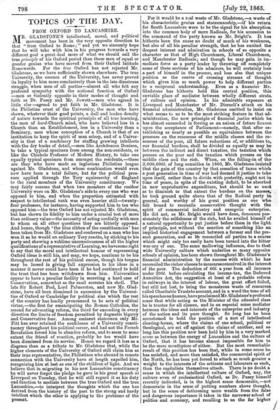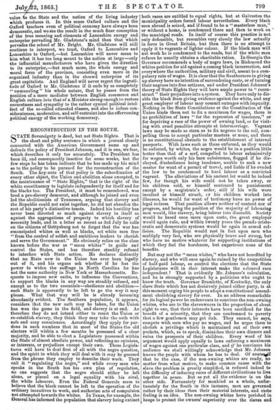TOPICS OF THE DAY.
FROM OXFORD TO LANCASHIRE.
MR. GLADSTONE'S intellectual, moral, and political movement has been in the very opposite direction to that "from Oxford to Rome ; " and yet we sincerely hope that he will take with him in his progress towards a very different goal a great deal more of what we should call the true principle of his Oxford period than those men of equal or greater genius who have moved from their Oxford latitude Romewards. For the true Oxford has not rejected Mr. Gladstone, as we have sufficiently shown elsewhere. The true University, the essence of the University, has never proved its loyalty to him more conclusively than in the late disastrous struggle, when men of all parties—almost all who felt any profound sympathy with the national function of Oxford —men as violently opposite in their modes of thought and faith as Dr. Pusey and Mr. yowett—men who agreed in little else—agreed to put faith in Mr. Gladstone. It is the Philistine crust of the University, the men who have shown, whatever their good points, a dull and leaden density of nature towards the spiritual principle of all true learning, the men of hard-Church mind, who have believed less in a Church than an Establishment, less in a University than a Seminary, men whose conception of a Church is that of an institution to keep the spirit of man asleep, and of a Univer- sity is that of a machinery for stuffing growing intellects with the dry husks of detail,—men like Archdeacon Denison, to take a typical specimen from among the non-residents, or like the Chichele Professor of Modern History, to take one equally typical specimen from amongst the residents,—these are they who have made an inglorious Philistine league against Mr. Gladstone, and whose combination would even now have been a total failure, but for the political pres- sure applied through the Tory squirearchy of England to the rural members of the University constituency. We may fairly assume that when two members of the resident University were on Mr. Gladstone's side to every one who was opposed to him, and when the proportion estimated with respect to intellectual rank was even heavier still—twenty- four professors, for instance, having supported him to ten who opposed him—the true Oxford has not rejected Mr. Gladstone, but has shown its fidelity to him under a crucial test of more than ordinary value—the necessity of acting cordially with men to whom on all other questions they are bitterly opposed. And hence, though the blue ribbon of the constituencies' has been taken from Mr. Gladstone and conferred on a man who has won it as he would an ordinary Tory rosette, by sticking to his party and showing a sublime unconsciousness of all the higher qualifications el a representative of Learning, we havesome right to say that the moral and intellectual honour of representing Oxford ideas is still his, and may, we hope, continue to be his throughout the rest of his political career, though his tongue may be loosed in giving full expression to his ideas in a manner it never could have been if he had continued to hold the trust that has been withdrawn from him. Universities appear to have a peculiar facility in secreting a hard case of Conservatism, somewhat as the snail secretes his shell. The late Sir Robert Peel, Lord Palmerston, and now Mr. Glad- stone, have all been dismissed in succession by the Universi- ties of Oxford or Cambridge for political sins which the rest of the country has loudly pronounced to be acts of political virtue,—the first for emancipating the Roman Catholics, the second for advocating reform, the third for exceeding in every direction the limits of freedom permitted by dogmatic bigotry and Conservative fear. Among eminent statesmen only Mr. Pitt has ever retained the confidence of a University consti- tuency throughout his political career, and had not the French Revolution forced him to abandon reform, and to seem to some extent the friend of reaction, probably he too would have been dismissed from its service. Hence we regard it less as a disgrace than as a tribute to Mr. Gladstone that, while the higher elements of the University of Oxford still claim him as their true representative, the Philistines who abound in remote connection with the University have at length expelled him, recognizing him at last as one of the children of light. And we believe that in migrating to his new Lancashire constituency he will never forget the pledge he gave in his great speech at Liverpool on Tuesday, that he will still regard it as his duty and function to mediate between the true Oxford and the true Lancashire,—to interpret the thoughts which the one has derived from the history of the past to the strong and hardy intellect which the other is applying to the problems of the present. For it would be a real waste of Mr. Gladstone,—a waste of his characteristic genius and statesmanship,—if his return for South Lancashire were to be the signal for his absorption into the common body of mere Radicals, for his accession to the command of the party known as Mr. Bright's. It has hitherto been the cause no doubt of much of his weakness,. but also of all his peculiar strength, that he has excited the deepest interest and admiration in schools of so opposite a character as that of High Churchmen, Liberal Churchmen, and Manchester Radicals; and though he may gain in im- mediate force as a party leader by throwing off completely some of these sections of his admirers, he will certainly lose, a part of himself in the process, and lose also that unique position as the centre of crossing streams of thought. which gives him so much power to help different parties• to a reciprocal understanding. Even as a financier Mr. Gladstone has hitherto held this central position, this. enviable place of mediator between wholly different strata. of culture and opinion. In his admirable exposure at Liverpool and Manchester of Mr. Disraeli's attack on his financial administration, Mr. Gladstone omitted to insist on what seems to us to be the most striking feature in that ad- ministration, the new principle of financial justice which ha has almost succeeded in forcing as an axiom of future finance, upon the acceptance of Parliament—namely, that after es- tablishing as nearly as possible an equivalence between the pressure on the resources of the middle classes and the re- sources of the poor, all future reductions of, or additions to,. our financial burdens, shall be divided as equally as may be• between the indirect and direct taxation, the taxation which presses on the poor and the taxation which presses on the middle class and the rich. When, on the falling-in of the- 2,000,000/. of long annuities in 1860, Mr. Gladstone insisted that the gain of the country by that cessation of taxes which a past generation in time of war had deemed it justice to take upon itself, rather than to divide with posterity, ought not in time of peace, in spite of the existing deficit, to be absorbed in new unproductive expenditure, but should be so used as to diminish to that extent the burdens on the masses, he took ground quite above that of the Radical party is general, and worthy of his great position as one who felt bound to reconcile conservative thought with the spirit of commercial industry and energetic enterprise. He did not, as Mr. Bright would have done, denounce pas- sionately the selfishness of the rich, but he availed himself of a natural opportunity to put justice before them in the light of principle, not without the sanction of something like an implied historical engagement between a former and the pre- sent generation, and so lfe reconciled all parties to a course which might only too easily have been turned into the bitter war-cry of one. The same mellowing influence, due to that wide University culture which underlies so many opposite schools of opinion, has been shown throughout Mr. Gladstone's• financial administration by the success with which he has reconciled the richer classes to measures conceived in the interest of the poor. The deduction of 601. a year from all incomes under 2001. before calculating the income-tax, the Deferred Annuities Act, the suggestion at least of a probable reform in railways in the interest of labour, the great effort foiled, but still not lost, to bring the monstrous waste of resources. called Charitable Trusts to account, and in a word the tone of all his speeches on finance, have proclaimedMr. Gladstone's profound sense that while acting as the Minister of the educated class he is trustee for all classes, and in an especial sense mediator between the ideas and interests of the enterprise and industry of the nation and its pure thought. So long has he been accustomed to hold the position of a sort of intellectual clearing-house, where the claims of one school, political or theological, are set off against the claims of another, and Be long has this position now been held by him in a very marked sense as between the energy of Lancashire and the culture of Oxford, that it has become almost impossible for him to be the mere mouthpiece of either. But the most remarkable result of this position has been that, while in some sense he has satisfied, and more than satisfied, the commercial spirit of the North, he has been yet forced to attach so much greater a weight to the interests of the artizans and labourers as such, than the capitalists themselves attach. There is no doubt a sense in which the intellectual culture of Oxford, nay, the culture even of ecclesiastical Oxford, as Dr. Pusey himself recently indicated, is in the highest sense democratic,—not democratic in the sense of putting numbers above thought, but in the sense of dethroning mere wealth from the false and dangerous importance it takes in the narrower school of politics and economy, and recalling to us the far higher , value.' the State and the nation of the living industry which produces it. In this sense Oxford culture and the Oxford teachers even of political economy have always been democratic, and we see the result in the much finer conception of the true meaning and elements of Lancashire energy and enterprise pervading Mr. Gladstone's mind than that which pervades the school of Mr. Bright. Mr. Gladstone will still continue to interpret, we trust, Oxford to Lancashire and Lancashire to Oxford,—but Lancashire will never mean to him what it has too long meant to the nation at large—only the influential manufacturers who have given the direction to its enterprise,—but much more, the whole energy and moral force of the province, consisting even more in its -organized industry than in the shrewd enterprise of its great capitalists. And England will never regret the ingrati- tude of Oxford to Mr. Gladstone if it ends by so completely " unmuzzling " his whole nature, that he passes from the position of a mere mediator between English commerce and English culture into that of a Minister strong enough to restore earnestness and sympathy to the rather cynical political intel- lect of the so-called educated classes, and also to infuse con- siderateness, moderation, and self-restraint into the effervescing political energy of the working democracy.































 Previous page
Previous page